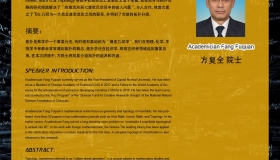Digital Traces in Social Sciences & the Role of Financial Literacy in Online Peer-to-Peer Lending: an Empirical Approach
|
Topic: |
Digital Traces in Social Sciences & the Role of Financial Literacy in Online Peer-to-Peer Lending: an Empirical Approach |
|
|
Time&Date: |
14:00-15:15 pm, 2019/10/24 (Thursday) |
|
|
Venue: |
Room 619, Teaching A |
|
|
Speaker: |
Prof. Tuan Q. Phan (The University of Hong Kong) |
|
|
Abstract: |
First, I will present an overview of my research which use large-scale and population-size digital traces to uncover social science phenomena and mechanisms which otherwise can not be studied in the lab or through interventions. I apply a number of techniques for a variety of data types including mobility and location data, dynamic and evolving networks, social media, and transactions data to a variety of context including consumer behavior in micro-lending, how students connect with others in the aftermath of sexual harassment, the antecedent of mental health in social media, the dynamic and evolving network of students and its effects on their outcomes, how flight delays affect consumer shopping behavior, users' consumption and sharing of news articles, and how consumers behavior to novel opt-in mobile advertising technologies. In the second half, I will go in depth about financial literacy in peer-to-peer lending. While peer-to-peer lending has increased financial inclusion, little is known about whether those with newly found financial access are well-equipped to make the right decisions and thus benefit from financial services. Due to the complex nature of financial products and services, financial literacy (i.e. individual’s ability to process economic information and make informed decision) plays a key role. In this study, we collaborate with a large P2P platform and create a measurement for financial literacy. Rather than assessing financial literacy through survey questions, we measure it by observing individuals’ actual decisions made on personal credit in the platform. Our preliminary results demonstrate the importance of financial literacy for both borrowing and investment in online P2P lending context. Our study contributes to the nascent literature on FinTech, and provides practical insights for P2P lending platform owners and policy makers. |




